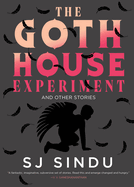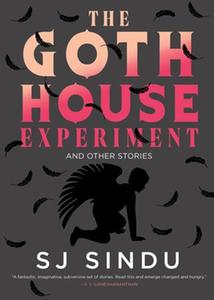
 Creepy, vibrant, dark, and even funny, The Goth House Experiment spotlights Lambda Literary finalist SJ Sindu's skill with the short story form. These half dozen stories are rich with social commentary, layered and keenly observed.
Creepy, vibrant, dark, and even funny, The Goth House Experiment spotlights Lambda Literary finalist SJ Sindu's skill with the short story form. These half dozen stories are rich with social commentary, layered and keenly observed.
The character Amit's story, "Patriots' Day," isn't solely about anti-Asian violence. It's also about the slow decay of a marriage, and the pressures of changing circumstances on a formerly illicit relationship. And it's about gendered and age-based workplace discrimination, and the multitude of smaller ways in which people hurt each other.
Many entries are set firmly in time or place, but Sindu turns them timeless with a focus on the characters' complicated internal lives. The couple in "Wild Ale" grapples with the Covid-19 pandemic as everyone goes slightly mad, including the main character, who obsesses over home-brewing projects and strains on their finances and relationships: "Maybe this pandemic has made us all into assholes. At the very least, it's made us into cornered animals, hissing and spitting at the faintest shadows."
Sindu's artistic range is also on display in the titular "Goth House Experiment," in which three creative people share a home, and one spins into madness fueled by grief, the specter of Oscar Wilde, and fentanyl.
Like Sindu (Blue-Skinned Gods), many of the central characters are South Asian or queer, and the author portrays them with the complexity and diversity of human experience. The bisexual femme professor in "Dark Academia and the Lesbian Masterdoc" is subject not only to biphobia online, but also to racism. One of the two central characters in "Patriots' Day" is an almost-divorced Indian man in a relationship with a white woman; the other is that woman's estranged, bigoted mother. Amit's imminent death is mentioned at the beginning of the story, ratcheting up the tension. When it's revealed that this Boston Marathon day is the year terrorists set off bombs at the finish line, but Amit isn't there, his death is once again a mystery. His journey home is perilous, but the ending is ambiguous. Amit will die, but how?
Sindu invites readers to examine and ultimately accept these characters as they are: narcissistic, loving, unfaithful, righteous, greedy, kind, bigoted. There are no convenient endings here, but readers won't need them. Sindu's characters are terrible, wonderful, and, most of all, human. --Suzanne Krohn, librarian and freelance reviewer
Shelf Talker: Wide-ranging and incisive, this dark and moody collection of six short stories will thrill fans of Carmen Maria Machado's Her Body and Other Parties.

